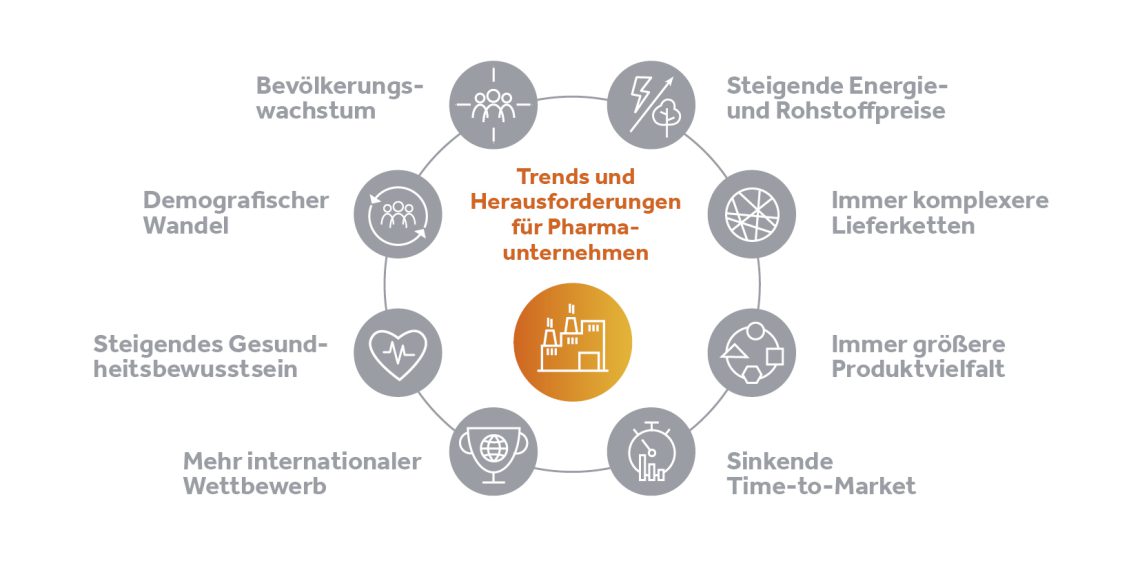The complexity of the entire supply chain in the pharmaceutical industry continues to increase. At one of the world’s leading manufacturers, this led to bottlenecks in production — even the procurement of the required secondary packaging was unnecessarily costly and time-consuming. Packaging specialist Faller Packaging helped the company to make this process faster, more reliable, more cost-effective and more sustainable.
The pharmaceutical and healthcare industry is one of the largest and most dynamic growth markets in the world. There are various reasons for this, such as a rapidly growing world population and demographic change towards increasingly older societies. As a result, demand for medicines and other pharmaceutical products is rising. For most pharmaceutical manufacturers, however, the market environment has also become much more volatile — due to increasing international competition, new forms of therapy and dosage forms, and the trend toward greater individualization. In addition, the so-called time-to-market is falling, i.e. more and more products are coming onto the market in ever shorter periods of time.
This is having a serious impact on production behavior in the industry: The batch sizes of individual orders are decreasing significantly, while the order volume is increasing. More frequent changes and changing requirements in the production process are the result. Shorter lead times and high cost efficiency are also required to be successful in the market. All this means that the entire supply chain for the manufacture of pharmaceutical products is becoming considerably more complex — also in terms of the procurement of the associated packaging.
Increasing article variety, decreasing predictability
The increasing individualization of pharmaceuticals is leading to a growing variety of articles. Secondary packaging, which is often designed differently according to customer or country, such as folding cartons, labels and package inserts, is particularly affected by this. It is becoming more difficult for pharmaceutical companies to correctly estimate their packaging requirements in advance and to clock times and production and logistics processes accordingly. The result is unnecessary and avoidable costs, for example for storage space, transport, machine downtime or the destruction of superfluous materials.
This challenge was also addressed by a leading global pharmaceutical company that manufactures wound care products, among other things, at one of its plants in southern Germany. The increasing demand for the products also caused the production volume at the site to grow steadily year after year — however, without being able to expand the capacities on site. More and more orders with small batch sizes and short lead times led to bottlenecks in production, caused unnecessary costs and severely restricted the manufacturer’s ability and reliability to deliver.
Complex ordering and inspection processes simplified
The company had been relying on Faller Packaging for the procurement of secondary packaging materials for some time. The packaging specialist, headquartered in Waldkirch, Baden-Württemberg, supplied folding cartons, labels and package inserts to the nearby production site from a single source — but the customer always submitted a separate order for each product. A labor-intensive and unnecessarily complicated process.
In addition, the pharmaceutical manufacturer had to subject all incoming goods to a strict quality inspection — including the packaging components. However, the area where the deliveries to be inspected were temporarily stored was limited and regularly overfilled. Errors in allocation and expensive delays due to overloading of the inspection department were the result.
Together with Faller Packaging, the company set out to make the procurement process simpler, more efficient and faster. In the first step, the orders for folding cartons, labels and package inserts were bundled by product — instead of three orders, only one was received by the supplier. The supplier was able to optimally distribute the KIT orders to its internal production capacities in the various plants, produce them and then combine them on pallets before shipping them to the customer.
Full control over inventories
In addition, the pharmaceutical manufacturer introduced a vendor-managed inventory (VMI) with its supplier. As a result, Faller Packaging assumed complete responsibility for the customer’s product inventories. For this purpose, the customer shares the inventory and sales figures for the respective articles. Instead of receiving orders for individual items, Faller Packaging uses this data to determine when which product is needed and in what quantity, and then initiates the corresponding production. This has enabled the specialist to deliver the relevant orders to the customer at short notice and significantly relieve the pressure on on-site storage capacities. By being able to plan raw materials and capacities at an early stage and use them efficiently, time and costs can also be saved. The pharmaceutical manufacturer was also able to outsource a significant part of the complexity involved in procuring secondary packaging materials and thus focus more on its actual value creation.
In order to also optimize the quality assurance process, Faller Packaging, as a Certified Supplier, took over the inspection of the products supplied. This meant that the pharmaceutical manufacturer no longer needed to have the products tested again in-house. After a short incoming inspection, the packaging required for production could be delivered quasi just-in-time to the packaging line — an enormous time and cost saving. Thanks to its support, Faller Packaging was able to reduce the lead times in the pharmaceutical company’s production by an average of 65 percent and cut its expenses by around 400,000 euros.

















